Western Digital WD740ADFD: Bottled Lightning
by Gary Key on February 7, 2007 3:30 AM EST- Posted in
- Storage
PCMark05 Performance
We are utilizing the HDD test suite within PCMark05 for further comparative hard disk scores as it provides a mixture of actual application results and specific read/write percentages utilized within these programs. It is also a readily available benchmark that others can use for comparative purposes. The program utilizes the RankDisk application within the Intel iPeak SPT suite of tools to record a trace of disk activity during usage of real world applications. These traces are then replayed to generate performance measurements based upon the actual disk operations within each application. The HDD test suite contains 53% read and 47% write operations with each trace section utilizing varied amounts of read or write operations. Additional information about the test suite can be found in PDF format here PCMark05 whitepaper.
The PCMark05 test results are based upon the following trace runs:
Windows XP Startup: This test consists of 90% reading and 10% writes that tracks XP activities at start-up.
Application Loading: This test consists of 83% reading and 17% writes that tracks the opening and closing of the following programs.
File Write: This test consists of 100% write activities by writing 680MB of files onto the hard disk.
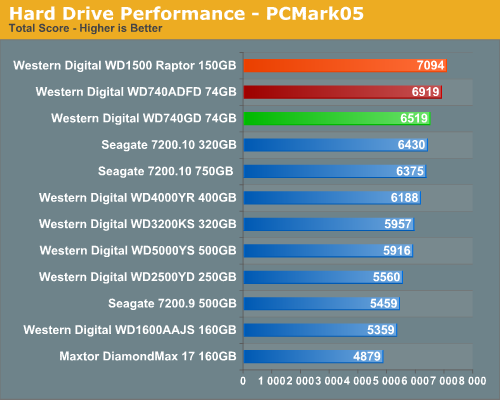
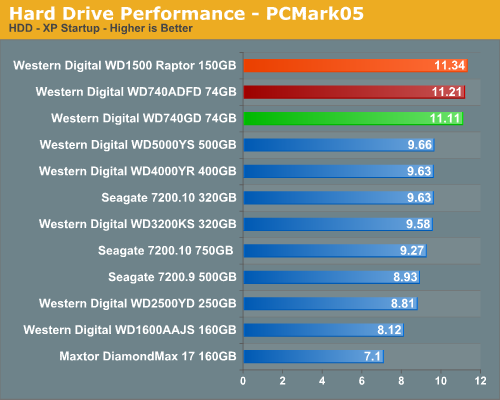
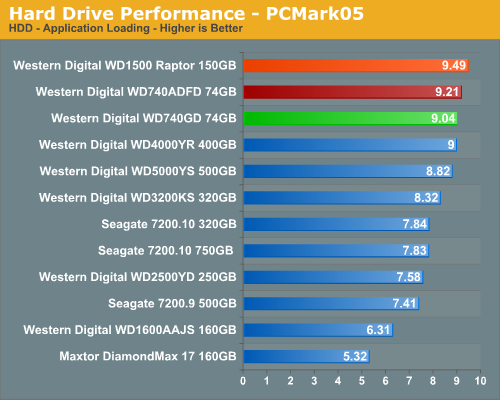
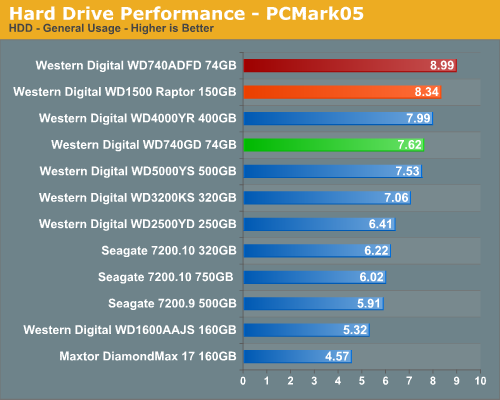
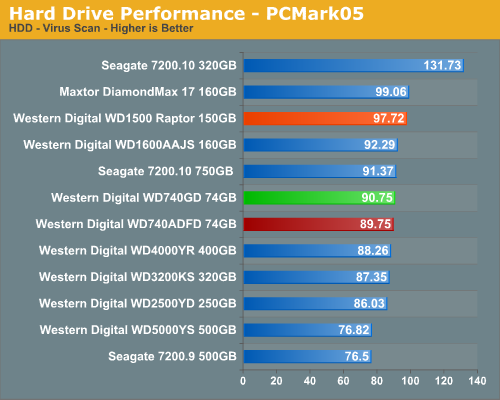
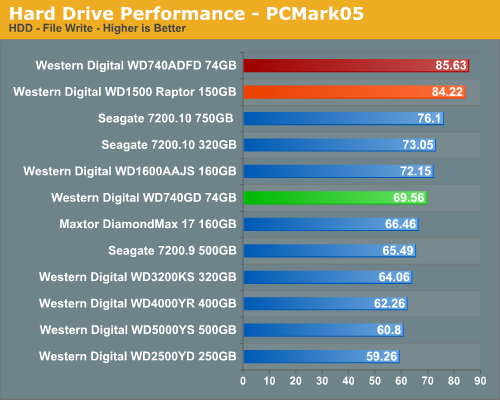
Our PCMark05 numbers follow a familiar test pattern with the WD Raptor series having a significant advantage over the drives in our tests. The performance delta between the two 74GB drives is 6% with the major differences occurring in the General Usage and File Write sections of the test where writes are a very important part of the test. Our WD740ADFD has excellent write speeds and surpasses the WD1500ADFD in these particular write heavy tests while just trailing it in the read intensive tasks.
We are utilizing the HDD test suite within PCMark05 for further comparative hard disk scores as it provides a mixture of actual application results and specific read/write percentages utilized within these programs. It is also a readily available benchmark that others can use for comparative purposes. The program utilizes the RankDisk application within the Intel iPeak SPT suite of tools to record a trace of disk activity during usage of real world applications. These traces are then replayed to generate performance measurements based upon the actual disk operations within each application. The HDD test suite contains 53% read and 47% write operations with each trace section utilizing varied amounts of read or write operations. Additional information about the test suite can be found in PDF format here PCMark05 whitepaper.
The PCMark05 test results are based upon the following trace runs:
Windows XP Startup: This test consists of 90% reading and 10% writes that tracks XP activities at start-up.
Application Loading: This test consists of 83% reading and 17% writes that tracks the opening and closing of the following programs.
- Microsoft Word
- Adobe Acrobat Reader
- Windows Media Player
- 3Dmark 2001SE
- Leadtek WinFast DVD
- Mozilla Internet Browser
- Opening a Microsoft Word document, performing grammar check, saving and closing
- Compression and decompression using WinZip
- Encrypting and decrypting a file using PowerCrypt
- Scanning files for viruses using F-Secure Antivirus
- Playing an MP3 file with Winamp
- Playing a WAV file with Winamp
- Playing a DivX video using the DivX codec and Windows Media Player
- Playing a WMV video file using Windows Media Player
- Viewing pictures using Windows Picture Viewer
- Browsing the Internet using Microsoft Internet Explorer
- Loading, playing and exiting a game with Tom Clancy's Ghost Recon
File Write: This test consists of 100% write activities by writing 680MB of files onto the hard disk.






Our PCMark05 numbers follow a familiar test pattern with the WD Raptor series having a significant advantage over the drives in our tests. The performance delta between the two 74GB drives is 6% with the major differences occurring in the General Usage and File Write sections of the test where writes are a very important part of the test. Our WD740ADFD has excellent write speeds and surpasses the WD1500ADFD in these particular write heavy tests while just trailing it in the read intensive tasks.










26 Comments
View All Comments
Genx87 - Wednesday, February 7, 2007 - link
Once you have one you cant go back :DThey are wonderful drives. The capacity issue isnt a big deal unless you are opting for the 36GB version. I havent had a need for excessive amounts of capacity since I built my sever a couple of years ago.
I built a server with a pair of the 36GBs with a 500GB array behind it for storage. It is a very nice step up from the pair of 80GB 7200 rpm drives in there before.
aka1nas - Wednesday, February 7, 2007 - link
They definately make great OS/Applications drives if you back them up with a bigger drive for bulk storage.Genx87 - Wednesday, February 7, 2007 - link
oops forgot to mention my machine at home has the newest 74GB raptor in it. Which is an upgrade from the 1st run 74GB raptor in my old machine.Blazing fast, as usual.
Muzzy - Wednesday, February 7, 2007 - link
"Of course, if you are into benchmarking or run a lot of disk intensive applications, then a pair of Raptors in RAID 0 will be even better."Um, aren't you guys contradicting yourself here? In July 1st, 2004 article about Raptor drives in RAID-0, you stated "If you haven't gotten the hint by now, we'll spell it out for you: there is no place, and no need for a RAID-0 array on a desktop computer." I love my 150GB Raptor despite the noise, don't get me wrong. Really do wish though that other company would give WD some competition in this category. $190 for 150GB??
JarredWalton - Wednesday, February 7, 2007 - link
Most people don't really care about running benchmarks for bragging rights, and most desktop users do not "run a lot of disk intensive applications". We don't think RAID 0 is even remotely necessary for 99% of people, but there are still benchmarks where it is obviously faster. If you have BitTorrent running in the background with other networked computers streaming data off of the same drive and you start to run games that load off of the same drive, yes, RAID 0 will clearly outperform a single drive. That's more of a server/workstation workload, which is why we say that RAID 0 on a desktop computer isn't needed.Axbattler - Thursday, February 8, 2007 - link
*Ponders*Where RAID-0 excels is in STR performance. Loading of applications that benefit from STR (e.g. XP), copying a large massive file, working with a large massive file (video editing) etc. are applications where you will see a significant gain with RAID-0.
RAID-0 may well be faster than a single drive identical drive in most applications (you do pay slightly in access time, but the gain from STR can probably offset it more often than not).. But how about a well two individual drives in a reasonably configured system? I am not convinced that in the scenario that you've described (which, I do not believe reflects the nature of the workload in a server in the first place), that you are necessarily better off with RAID-0 than two individual drives. I would rather have one drive running the game, and the other doing the streaming/torrenting. Game loading time is not exactly where I've seen RAID-0 shine the most (and once the game is running, you'll pretty much get no gain from RAID-0).
JarredWalton - Thursday, February 8, 2007 - link
Then carry it a bit further. Basically, I'm saying that if you generate enough concurrent HDD accesses, RAID 0 will outperform single drives. You might get better performance from two drives without RAID 0, but then you need to worry about having separate volumes and what happens if most of the accesses start to target a single drive. Basically, RAID 0 can be faster than an individual drive, but this mostly occurs in unrealistic situations, as you point out. RAID 0 mostly seems to be for bragging rights, and I certainly don't recommend it.lemonadesoda - Wednesday, February 7, 2007 - link
Most Raptorers (the people who love and install them) typically choose a dual drive RAID setup for ultimate HDD performance.However, seeing the (very close) performance of Seagate 7200.10, I would be very interested to see Raptors in RAID vs 7200.10 in RAID.
Would the performance gap INCREASE or DECREASE in such a configuration?
Le Québécois - Wednesday, February 7, 2007 - link
It's nice to see my WD1500ADFD is still the top gaming drive on the market. Still something has been bothering me for some time now.I've always found intriguing that my Raptor temperature is about 40% lower (idle and under load) than the one you post on every HDD articles. I have a 80mm Antec front fan but still the temperature is 40% lower, not 25%.
What's the room temperature? You always post the base dB of the room but I don't remember ever seeing the temperature.
jabber - Wednesday, February 7, 2007 - link
Indeed, I bought one of these 74Gb Raptors a few weeks ago and it never gets more than slightly warm. Certainly doesnt warrant an 80mm fan blasting on it.I do recommend the WD Secure SATA cable though. Great bit of kit. How the standard SATA cable connection setup got approved I'll never know.
The niggle I have is that 74Gb is too small? I have a full XP install, several apps and games (BF2/Total War etc. etc. and its still got plenty of space. Why would you bother cluttering up your main system HD with non-essential stuff like media files? Just get a cheap 400Gb+ for that sort of thing where performance isnt an issue.